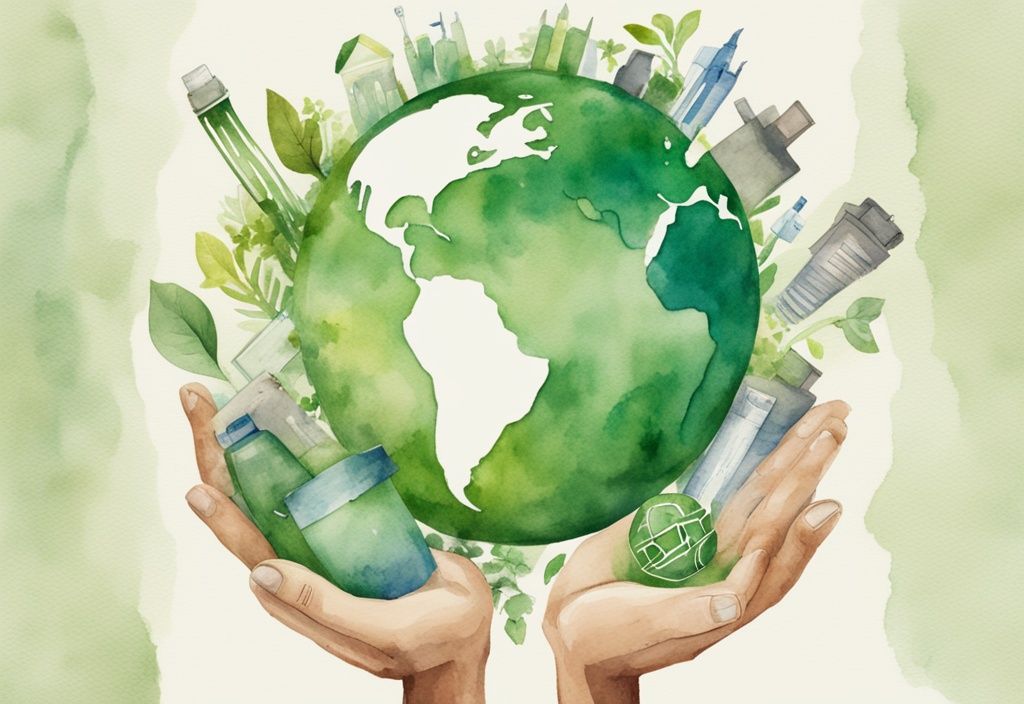Why Zero Waste is Important: Uncover the Power of Sustainable Living
As a society, we’re sinking under our own waste – with each American churning out over 1,600 pounds of trash per year. Doesn’t that make you stop and think? It sure got me, Olivia Green from Nontoxicways.com, thinking about how important zero waste lifestyle can be. Not only can it drastically reduce our trash footprint, but it’s also a concrete step towards a sustainable future.
In this article, I’ll share why adopting zero waste principles can improve not only your life but also our precious planet. Through evidence-based insights, you’ll learn how this lifestyle shift impacts our environmental health and shapes the economy.
Come along with me on this journey as we explore the transformative power of zero waste, how simple it is to incorporate into our daily lives, and why it’s a crucial piece in the sustainability puzzle.
Understanding the Zero Waste Concept
Zero waste living is a conscious effort to diminish harmful environmental impacts by reducing waste generation. This sustainable lifestyle beckons us to make significant changes in our daily habits, aiming to cut waste right at its source. Understanding why zero waste is important can truly reinforce one’s dedication to embracing and upholding this way of life.
Imagine zero-waste living as a close kin to minimalism, where we focus on essential and multifunctional items. This approach not only saves money, space, and time but also curtails waste production. Through regular waste audits and practical measures to lessen it, we can bring about substantial change.
Additionally, zero-waste living heightens our awareness of environmental degradation, climate change, and social justice. It fosters a deeper understanding of these critical issues, urging us to redesign the entire resource cycle to eradicate waste at every stage. This transformative mindset underscores why zero waste is important in driving systemic change.
Consider this: the average American churns out about 4.4 pounds of trash each day, accumulating to over 1,600 pounds annually. Such statistics starkly highlight the enormous environmental footprint we each leave behind and the significant impact we can potentially make.
Zero Waste and Its Impact on the Environment
Lessening Landfill and Marine Waste
The sheer volume of waste ending up in landfills is staggering, and with it comes significant contributors to climate change, such as carbon dioxide and methane emissions. By embracing zero-waste practices, we’re not just reducing waste; we’re actively cutting down on these harmful emissions. Did you know that a whopping 70% of landfill materials, including paper, can be recycled? That statistic alone underscores our untapped potential for resource recovery.
And it’s not just about what’s happening on land. Plastic waste infiltrates our oceans, wreaking havoc on marine life and ecosystems. By minimizing landfill contributions, we also intervene in this destructive cycle, preventing toxins from leaching into our soil and groundwater. This is where the heart of zero waste beats most clearly: in its protective embrace of our environment.
Reducing Environment-Harming Emissions
One core reason why zero waste is important lies in its capacity to reduce environmentally harmful emissions. Fewer items sent to landfills mean less decomposition and methane release. For organic waste, composting is a beautiful alternative, naturally breaking down food waste, which constitutes about 22% of municipal solid waste.
Recycling offers another win. When we recycle, we save significant amounts of energy compared to creating new products from scratch. This reduction in energy demand minimizes the need for resource extraction. Plus, zero waste initiatives encourage using recycled materials, requiring less energy to process than raw materials. It’s a cycle of care that consistently reduces emissions.
Preservation of Natural Resources
Embracing zero waste doesn’t just address immediate environmental issues—it profoundly conserves our natural resources. By curbing the extraction of nonrenewable resources, we avoid processes that are both costly and environmentally damaging.
Imagine reducing our dependency on mining, logging, and raw material extraction—each step taken towards zero waste is a step towards preserving finite resources.
Moreover, efficient material use ensures these precious resources remain available for future generations. This is another reason why zero waste is important; it promotes long-term sustainability. If you’re curious about sustainable products, you might wonder is Native shampoo good for your eco-friendly routine?
When we make thoughtful choices today, we unlock a healthier, more abundant world for tomorrow. It’s a journey deeply intertwined with the well-being of both our planet and its people.
Zero Waste: A Key to Healthy Communities and Economies
Zero waste practices are pivotal in improving air and water quality, which reflects why zero waste is important. By generating less waste, fewer landfills and incinerators are needed, leading to reduced pollution levels in surrounding communities. Fewer deliveries, shopping trips, and the reduced necessity for trash incineration further decrease localized pollution, ensuring cleaner air. Additionally, the use of zero-waste cleaning and self-care products minimizes the exposure to toxic chemicals, fostering healthier living environments. These combined efforts highlight why zero waste is important in maintaining ecological and community health.
Improvements in Air and Water Quality
Zero waste living plays an essential role in improving air and water quality. When we minimize waste production, fewer landfills and incinerators are required, which leads to a decrease in harmful pollutants in our communities. For example, reduced need for incineration lowers localized pollution, ensuring the air we breathe is cleaner.
Personally, I’ve noticed a significant change since embracing zero-waste household products. Using zero-waste cleaning and self-care items means fewer toxic chemicals are released into our environments, fostering safer and healthier living conditions. This personal shift has shown me firsthand why zero waste is important for protecting both ecological and community health.

Fostering Socio-Economic Wellbeing
To understand why zero waste is important, we must look beyond just the environmental impact. Zero waste also offers remarkable socio-economic benefits. By encouraging a culture of reuse, recycling, and repair, it sparks innovation in both product design and waste management.
Take my local community as an example: many businesses have started treating discarded materials as valuable resources, consequently creating economic opportunities and jobs. This shift not only reduces the burden of waste management costs but also promotes a more mindful and stress-free lifestyle.
Adopting zero waste has transformed my day-to-day life, providing me with a sense of well-being and clarity. It’s truly remarkable how these small changes can enhance our individual and collective quality of life.
Green Jobs and Cost Efficiency
Exploring why zero waste is important wouldn’t be complete without discussing the economic benefits of green jobs and cost efficiency. The waste management and recycling sectors are growing at an impressive rate, sometimes doubling the growth rates of other industries.
For instance, companies committed to zero-waste strategies are paving the way towards sustainable business practices. This shift emphasizes why zero waste is important for economic stability, encouraging the reuse and repurposing of items. Although the initial costs of reusable products might be higher, the long-term savings are substantial.
A striking example is New York City, which spends over $300 million annually on exporting landfill waste. Implementing zero waste practices can significantly cut these expenses, illustrating why zero waste is important for achieving financial savings and operational efficiency.
These economic advantages align seamlessly with environmental sustainability, reinforcing our shared journey towards a healthier planet.
Adopting a Sustainable Lifestyle with Zero Waste Principles
Following the 5 R’s of Zero Waste: Refuse, Reduce, Reuse, Recycle, Rot
Zero waste is important because it initiates a thorough transformation in our resource management, leading to a truly sustainable lifestyle. Let’s dive into the principles:
The first principle, Refuse, means learning to say no to unnecessary items and promotional giveaways that end up as waste. I remember the first time I politely declined a freebie, it felt empowering to avoid clutter and waste from the start.
Reduce is all about limiting our consumption to essential, multipurpose items. By opting for fewer but higher-quality products, we decrease the demand for new materials and minimize our environmental footprint. I’ve found that embracing minimalism brings a refreshing simplicity to my life.
Next, Reuse encourages us to creatively repurpose items, giving them a second life. For instance, I transformed old glass jars into beautiful storage containers. This practice not only reduces waste but also sparks creativity.
Recycle plays a crucial role in ensuring recyclable materials like paper, glass, and metals are processed correctly and reused in manufacturing. It’s comforting to know that proper recycling conserves natural resources and reduces the need for new raw materials.
Lastly, Rot involves composting organic waste such as food scraps and yard waste. Composting has become a mindful habit for me, returning nutrients to the soil and reducing landfill waste. The transformation of waste into rich soil continues to amaze me.
Practicing Mindful Consumption
Understanding why zero waste is important begins with mindful consumption. This means making deliberate, conscious choices about what we buy. Prioritizing products with minimal or no packaging can substantially cut down on packaging waste and promote eco-friendly production.
By buying only what’s necessary, we reduce impulse purchases and waste generation. Zero waste principles encourage us to focus on the durability and quality of items, ensuring that our resources are used efficiently and sustainably.

Choosing high-quality, durable products not only minimizes environmental impact but also fosters a more sustainable lifestyle. Personally, investing in long-lasting items has significantly reduced my waste and brought a sense of fulfillment.
Zero waste is important because it empowers us to make choices that benefit both the environment and our well-being. As we embrace these principles, we create a positive ripple effect on the planet and the future. This journey, filled with practical changes, feels both attainable and deeply rewarding.
Zero Waste as a Response to Climate Change
Zero waste isn’t just a trend—it’s a powerful response to the growing urgency of climate change. This approach focuses on redesigning our lifestyles and waste management systems to minimize waste production, ultimately benefiting the environment and our communities.
Lowering Carbon Footprints
Zero waste practices play a pivotal role in shrinking both individual and community carbon footprints. By significantly reducing waste generation, we can decrease the emissions associated with waste disposal. Take composting, for instance. This zero-waste method does more than just divert organic waste from landfills; it actually aids in carbon sequestration in soil. The soil, enriched through composting, can absorb more carbon dioxide from the atmosphere, effectively reducing overall atmospheric carbon levels. On another note, recycling materials instead of extracting virgin resources dramatically lowers emissions. The energy required to recycle materials is far less than what’s needed for new production, making recycling a highly efficient way to slash carbon emissions.
Supporting a Circular Economy
One of the core reasons why zero waste is important is its promotion of a circular economy. This approach encourages us to design products with longevity, ease of repair, and recyclability in mind, ensuring they enjoy a longer lifecycle. Shifting our focus from waste disposal to resource recovery is crucial for minimizing environmental impacts. When we view discarded materials as valuable resources, we open the door to new product development and job creation, which are essential for a thriving, sustainable economy.
In many ways, nature’s zero-waste cycles provide the perfect blueprint for us. By mimicking these natural processes, zero waste fosters innovative and sustainable product designs, aligning waste management with environmental conservation and resource preservation.
Ultimately, understanding why zero waste is important highlights the dual benefits of reducing carbon footprints and supporting a circular economy. These outcomes not only help combat climate change but also promote long-term sustainability and environmental health, making our world a better place for future generations.
Implementing Zero Waste: Challenges and Solutions
The journey towards zero waste is an important endeavor faced with both obstacles and innovate solutions. This section explores the various challenges encountered and the strategies to overcome them, highlighting why zero waste is important for our collective future.
Overcoming Local Waste Management Hurdles
Embarking on a zero-waste journey can feel daunting, especially with the unique waste management challenges that different localities face. Various management options and varying climatic conditions add to the complexity. However, even modest efforts can bring about significant environmental changes, showing why zero waste is important.
One efficient approach to tackle these difficulties is through source reduction. This means designing products that not only generate less waste but also contain fewer harmful materials. Such mindful choices lead us toward sustainability, fostering better consumer habits.
Local regulations significantly bolster zero-waste initiatives. Laws like Local Law 19 and Local Law 77, which mandate recycling programs and organic waste collection, create a supportive framework, making zero-waste goals achievable for communities. These legislative measures underscore why zero waste is important, as they contribute to substantial environmental benefits.
Engaging in Zero Waste Policies and Programs
Governments and communities have a pivotal role in advocating for zero waste by launching comprehensive programs that build sustainable local economies. By promoting resource recovery over traditional waste disposal or incineration, these policies tackle long-term waste management issues, showcasing why zero waste is crucial for sustainable development.
Community collaboration is a cornerstone of successful zero waste programs. Through shared initiatives and efficient resource management, communities not only strengthen their bonds but also magnify their impact. Zero waste policies extend into the business and industrial sectors, where they significantly reduce environmental footprints. Companies that adopt zero waste practices not only enhance their brand image but also set new industry standards, driving innovation in waste management and product design.
Ultimately, achieving zero waste requires a collective effort from every sector of society. By encouraging both community and corporate dedication to sustainable practices, we reinforce why zero waste is important—not just for the environment but for the well-being of current and future generations.
Successful Zero Waste Initiatives: A Closer Look
Diving into why zero waste is important, we’ll explore inspiring initiatives by communities and businesses that prove sustainable living is not only achievable but profoundly impactful.
Community-Based Zero Waste Efforts
Community-based initiatives vividly demonstrate why zero waste is important through practical applications that both reduce waste and promote sustainability. For example, the redistribution of excess food and goods within a community helps to minimize waste while ensuring resources reach those in need, fostering a spirit of sharing and responsibility.
Equally, local composting initiatives and recycling drives emerge as powerful tools for raising environmental awareness and encouraging active participation among residents. These programs do more than just decrease landfill waste—they educate community members on the benefits of zero waste, creating a more environmentally conscious society.
Through shared zero waste projects and resource management, communities not only build stronger networks but also collaborate more effectively, generating a collective effort toward sustainability. Successfully implemented community efforts stand as inspiring models, showcasing achievable steps and strategies that other communities can adopt to meet zero waste goals.

Businesses Embracing Zero Waste
The commitment of major companies to zero waste practices powerfully underscores why zero waste is important on a broader scale, driving significant shifts in sustainable business practices. Adopting zero waste strategies allows businesses to reduce their environmental footprints and set new industry standards, pushing the envelope on product design and process innovation.
These innovations often pave the way for more sustainable alternatives, further cutting down overall waste. In addition to environmental benefits, implementing zero waste strategies leads to significant financial savings for businesses by reducing waste management costs.
Moreover, companies that prioritize zero waste practices frequently enjoy enhanced public perception and customer loyalty, as today’s consumers increasingly prefer brands that demonstrate environmental responsibility. Through their actions, these businesses clearly illustrate that sustainable practices are both economically sensible and beneficial, reinforcing the importance of zero waste in achieving long-term sustainability.
Conclusion: The Case for Zero Waste
The importance of zero waste extends far beyond reducing trash. It encompasses a holistic approach that addresses environmental, social, and economic challenges. Here, I’ll delve into why zero waste is so crucial and how it’s transforming lives and our planet.
Minimizing Environmental Impacts
Zero waste practices are essential in reducing environmental degradation. By focusing on redesigning the resource cycle, zero waste minimizes the generation of waste at every stage. This approach significantly lowers harmful environmental impacts such as soil and water contamination and the emission of greenhouse gases from landfills. Implementing zero waste measures directly correlates with reducing environmental harm and conserving valuable ecosystems, which is a pivotal reason why zero waste is important.
Conserving Natural Resources
One of the fundamental tenets of zero waste is the conservation of natural resources. By reducing waste and encouraging recycling and reuse, zero waste minimizes the need for raw material extraction. This preservation of nonrenewable resources also reduces environmental damage caused by mining and other extraction processes. Understanding why zero waste is important involves recognizing its role in sustaining the planet’s natural resources for future generations.
Improving Air and Water Quality
Adopting zero waste practices leads to tangible improvements in air and water quality. As landfills and waste incineration are reduced, fewer harmful pollutants are released into the atmosphere and water bodies. This decrease in pollution fosters healthier communities and ecosystems. Zero waste principles ensure a cleaner and safer environment, highlighting why zero waste is important for public health and environmental sustainability.
Addressing Environmental Justice Issues
Zero waste is also integral in addressing environmental justice. Communities located near landfills and industrial waste sites often face disproportionate health and environmental challenges. By reducing waste production and promoting sustainable waste management, zero waste principles help mitigate these issues, providing equitable environmental quality for all communities. Therefore, understanding why zero waste is important includes its role in fostering social equity and justice.
Reducing Unnecessary Spending
Zero waste living promotes a minimalist lifestyle, which can lead to significant financial savings. By concentrating on essential and multi-purpose items and reducing consumption, individuals and households can cut down on unnecessary expenses. This frugal approach not only saves money but also reduces the overall environmental footprint. Explaining why zero waste is important involves illustrating these economic benefits and the positive impact on personal finances.
Creating Economic Opportunities
The zero waste movement also generates economic opportunities through the development of green jobs in recycling, composting, and sustainable product design. Treating discarded materials as valuable resources fosters innovation and creates employment in new industries focused on resource recovery. Thus, understanding why zero waste is important includes acknowledging its contribution to economic development and job creation.
Promoting a Circular Economy
Zero waste is a cornerstone of the circular economy, an economic system aimed at eliminating waste and the continual use of resources. By designing products for longevity, repairability, and recyclability, zero waste helps shift from a linear economy to a more sustainable, circular one. This approach ensures that resources remain in use for as long as possible, significantly reducing waste. Therefore, why zero waste is important includes its ability to promote a more sustainable and resource-efficient economy.
FAQs on Zero Waste
What does Zero Waste mean?
– Zero Waste is an environmental movement focused on producing the least amount of waste possible to minimize the strain on landfill sites worldwide. This involves redesigning processes and lifestyles to prevent waste from being generated in the first place. Imagine a world where the trash can barely needs emptying. This vision lies at the heart of Zero Waste—rethinking and reshaping our habits to create as little waste as possible.
How does Zero Waste benefit the environment?
– Zero Waste reduces environmental footprints by minimizing waste, preserving natural resources, and lowering greenhouse gas emissions. It involves practices that promote sustainability and conservation, leading to healthier ecosystems and a reduction in pollutants. By embracing Zero Waste, not only do we save valuable natural resources, but we also significantly cut down on the pollution that harms our planet. Small changes in our daily routines can lead to a world of difference.
How can you start living a Zero Waste lifestyle?
– Begin by following the 5 R’s: Refuse, Reduce, Reuse, Recycle, and Rot. These steps encourage mindful consumption and waste reduction. Conduct regular audits of your waste generation to identify areas for improvement and adopt sustainable practices. Starting can feel overwhelming, but even simple steps like refusing single-use plastics or composting kitchen scraps can set you on the right path. Remember, every bit counts.
How impactful are Zero Waste practices?
– Zero Waste practices significantly decrease the volume of waste sent to landfills, reduce emissions, support sustainability, and enhance community well-being. These practices have a profound impact on conserving resources and mitigating environmental damage. When we think of the positive ripple effects—cleaner air, healthier communities, and a more vibrant planet—it’s clear that Zero Waste is a powerful tool for change.
What challenges might you face in a Zero Waste journey?
– Common challenges include local waste management limitations, initial costs of reusable products, and the need for systemic changes. Despite these obstacles, efforts toward Zero Waste can lead to substantial positive environmental impacts. It’s true, transitioning can be tough at times. But facing these challenges head-on not only fosters personal growth but also contributes to a larger, meaningful environmental impact.
Every effort we make towards Zero Waste, small or large, pulls us closer to a healthier, more sustainable world. With patience and perseverance, we can collectively turn the tide towards a greener future.
Hi, I’m Olivia Green, the voice behind nontoxicways.com. I’m passionate about helping you make the shift to a healthier, non-toxic lifestyle without feeling overwhelmed. I love sharing my personal journey, from small changes to big transformations, along with practical tips that make it all feel doable. My goal is to inspire and guide you toward a lifestyle that benefits both your well-being and the planet. Let’s take this journey together, one simple step at a time!














Post Comment